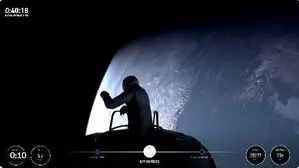
1st ever "all-civilian" spacewalk carried out by SpaceX's Polaris Dawn crew
text_fieldsNew Delhi: SpaceX’s Polaris Dawn astronauts on Thursday carried out history by successfully executing the first-ever 'all-civilian' spacewalk.
On Tuesday, a SpaceX Falcon 9 rocket carried the millionaire Jared Isaacman on the first commercial spaceflight mission.
Along with Isaacman, the mission launched pilot Scott "Kidd" Poteet, mission specialist Sarah Gillis, and medical officer Anna Menon.
“The Polaris Dawn spacewalk is now complete, marking the first time commercial astronauts have completed a spacewalk from a commercial spacecraft,” SpaceX said in a post on social media platform X.
“Today’s spacewalk is the first extravehicular activity (EVA) using commercially developed hardware, procedures, and the new SpaceX EVA suit,” the company added.
The crew began donning their suits following an extended pre-breathe procedure that lasted for 48 hours. After confirming the leak check, the hatch of the Dragon spacecraft was opened.
The opening of the Dragon’s hatch marked “the first time four humans are simultaneously exposed to the vacuum of space,” SpaceX said.
Mission commander Isaacman and mission specialist Gillis took turns exiting Dragon to test the mobility of SpaceX’s EVA spacesuit, which was switched on to a full oxygen flow.
During the spacewalk, Dragon repositioned itself so its trunk was facing the Sun to regulate temperatures and communications during the spacewalk.
Once Isaacman exited the Dragon, he used SpaceX's Skywalker mobility platform to secure himself as he floated in the vacuum of space.
The astronauts were tied to a 12-foot tether, which provided them with a steady flow of oxygen, communications lines, and a safety link securing them to the spacecraft as they performed the EVA operations.
SpaceX said Isaacman went “through the first of three suit mobility tests -- to test overall hand body control, vertical movement with Skywalker, and foot restraint”.
Gillis moved for her turn to exit the spacecraft after Isaacman was safely back inside, SpaceX said.
She “conducted the same series of suit mobility tests Isaacman completed,” SpaceX said.
The entire procedure, from decompression of the cabin to represurisation, took about two hours.
The free-flying mission flew to a “very high altitude that humans haven’t gone to in over 50 years”. Only the Apollo mission went higher.
On day 1 of the mission, Dragon reached the highest orbital altitude of the flight, a distance of about 1,400.7 kilometres.
The distance is the farthest from Earth humans have flown since NASA's Apollo 17 moon landing mission in 1972, and the highest Earth orbit by a crewed spacecraft since NASA's Gemini 11 mission in 1966.
With inputs from IANS











